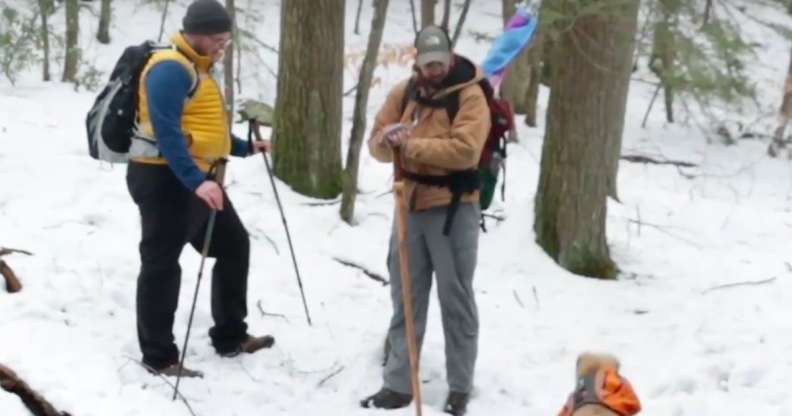These hikers marched across Massachusetts to campaign for trans rights

Two hikers marched across Massachusetts to raise awareness of transgender rights in the state, as a referendum vote in November threatens a crucial law protecting trans people from discrimination.
Campaigners Mason Dunn and Ev Evnen, who thought up their project #Hike4Rights back in in 2017, walked about 95 miles across the US state from August 12 until August 26.
Their route ran from the Connecticut border to the Vermont edge. Along the way, they discussed trans rights and issues with other walkers and members of the public.

Ev Evnen (left) and Mason Dunn on their hike. (Courtesy of #Hike4Rights)
Speaking to PinkNews, Dunn explained: “We embarked to have conversations with community members, hikers, and locals across Western Massachusetts about who we, as trans people, are.”
The pair also talked to people about the upcoming referendum vote in the state in November.
This vote will include a question on whether to retain a law, which was introduced in 2016, protecting trans people from discrimination in public places, including toilets, shopping centres and restaurants.
The hikers walked much of the route with Evnen’s dog and “trail scout” Maxwell.
Dunn added: “We talked to people about the upcoming referendum vote, to preserve and defend the legal nondiscrimination rights in public spaces—like parks, trails, restaurants, and hospitals—which we won in 2016.”
On August 25, the duo organised a community hike up Mount Greylock—the highest peak in Massachusetts—with about 20 people, where they waved a trans pride flag at the summit.
“If we lose non-discrimination protections in public accommodations on the November 2018 ballot, I could be forced to leave, or face other forms of discrimination in those places, with no legal rights,” Dunn explained.
Speaking about their aims for the #Hike4Rights project, Dunn added: “We hoped to raise awareness about trans identities, lives, and rights in Massachusetts.
“We hoped to persuade voters along the trail to vote ‘Yes on 3,’ to preserve or rights to access these spaces free from discrimination.
“And we hoped to humanise just who trans people are along the way.”

Mason Dunn (left) and Ev Evnen during #Hike4Rights. (Courtesy of #Hike4Rights)
Dunn also said that “as white trans masculine individuals” he and Evnen had the “privilege and safety to take this project on.”
He highlighted how trans people of colour, particularly trans women of colour, face “disproportionate levels of violence and discrimination, which we recognise and work to combat.”
“Outdoors recreation, like backpacking, hiking, and camping, is an extremely white-dominated subculture, which we witnessed first hand on the trail,” explained Dunn.
“Racism, economic disparities, sexism, and ablism make enjoying the outdoors inaccessible to many within the LGBTQ+ community.”

